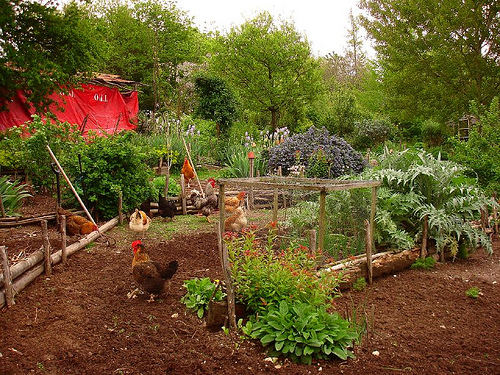One of the most serious drawbacks to having truly free-range chickens is that they can go anywhere they want to and they tend to want to go to your garden. This makes sense since, hopefully, your garden is a healthfully functional natural environment filled with potential prey (many of which you would be happy to see eaten) for your chickens.
Keeping Chickens Out
The downside of chickens in the garden when your chickens do what chickens do, and start kicking and scratching until they have unearthed the roots of your plants or even kicked your plants clean of the garden.
One way to combat this is to put chicken wire around the garden. This can be costly, even if you opt for the cheaper “bird netting” made from plastic.
And this solution still doesn’t allow your chickens to be much benefit to your garden, it just keeps them from being a pest. Preferably your chickens will eat potential pests and fertilize your garden while leaving it undamaged.
Letting Chickens In
One of the best ways to get the benefits of chickens in the garden without damaging your plants is to take the plastic bird netting and lay it on the ground, over your mulch, and between your plants. This will work whether you are growing in wooden raised beds or directly in the ground.
Areas like paths or fallow plots and beds are not necessary to cover. Concentrate on active beds, especially those with young vulnerable plants. The bird net can be stretched out to the size of the bed and cut to fit, one wide strips
are most versatile, “holes” can be made to accommodate the plants by using twist ties or landscaping stakes (or even sticks) to pull the net away from the plants and keep it secure. Stakes or twist ties can also be used to combine multiple pieces of netting. While holes could be cut in the net, that will make it more difficult to reuse in the
future.
This will allow for your flock to roam and feed to their heart’s content while cleaning out potential pests from your garden like caterpillars and slugs-and holding your mulch and your plants in place. They will even help fertilize as nature takes its course, and with chickens, that’s pretty often.

